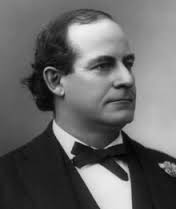Search
Search>> Government>> Politicians>> United States>> William Jennings BryanWilliam Jennings Bryan

Born March 19, 1860 - Died July 26, 1925
William Jennings Bryan was a American politician.
Bryan was born in Salem, Illinois on March 19th, 1860. Until the age of 10 Bryan was home schooled. At the age of 14, Bryan was sent to Whipple Academy in Jacksonville, Illinois. Also at the age of 14, he was baptized in the Cumberland Presbyterian Church. Of his baptism he later said it was the most important day in his life. Bryan attended Illinois College and graduated in 1881. During his time at Illinois College, Bryan was a member of Acacia Fraternity, a Masonic affiliated fraternity.
While studying for the bar, Bryan taught school. He began practicing law in 1883 before moving to Lincoln, Nebraska.
In the 1890 Democratic Landslide, Bryan was elected to the United States House of Representatives. He was reelected again in 1892. In 1890, the prohibitionist movement had begun and Bryan was a part of it.
In 1896, Bryan started his first of three attempts to become President of the United States. In his campaign, Bryan displayed an innate talent for oratory. He gave many speeches about his belief the Silver Standard should be brought back in the country. In his "Cross of Gold" speech he attacked wealthy easterners who, in Bryan's opinion, cared nothing for the working class people of the mid-west. He received the Democratic nomination for President, he was and continues to be the youngest nominee of any major political party at the age of 36.
In 1900, he ran a second time for President. This time he ran on an anti-imperialism platform. Republicans mocked him as indecisive and a coward. L. Frank Baum satirized him viciously when he based the Cowardly Lion from The Wonderful Wizard of Oz on Bryan. He lost the 1900 election and his control in the Democratic party was weakened.
In 1908, Bryan made his final run for the White House. He campaigned, among other things, against corporate domination, urging all corporation contributions be made public before election day, and failure to cooperate be made a penal offense. Over all three presidential elections, Bryan received 493 electoral votes, the most of any candidate in American history who never won the presidency.
From 1913 to 1915 Bryan served as Secretary of State for Woodrow Wilson.
Starting in 1916, Bryan campaigned for Women's suffrage and for prohibition. In 1918 he helped to pass the 18th Amendment prohibiting alcohol in the United States. In 1920, he refused to support the Democratic candidate for president since he felt the man was "not dry enough".
In 1918, along with the 18th Amendment, Bryan became an anti-evolution activist. He opposed Darwinian evolution in part because of his creationist beliefs. He also felt Darwinism had a social element, it involved the stronger (or wealthier) parts of society pushing out the weaker (or poor) parts of society. He lobbied states not to teach evolution in the class room. He also participated in the 1925 Scopes Trial.
Bryan passed away just five days after the Scopes Trial ended on July 26, 1925. He died from diabetes and fatigue.
Bryan was a member of Lincoln Lodge No. 19, Lincoln, Nebraska.
This article provided by Brother Eric C. Steele.